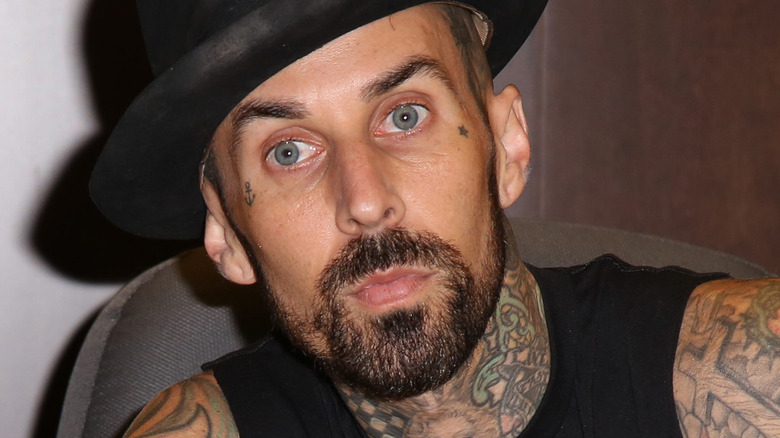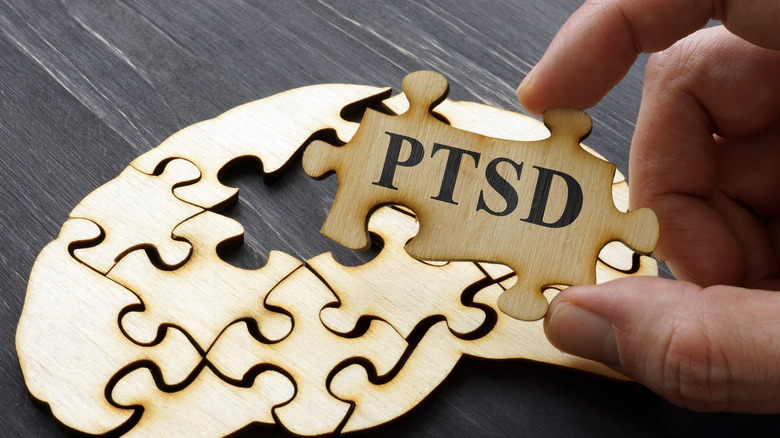Travis Barker's History With PTSD Explained
Travis Barker was long known as the drummer of pop-punk band Blink-182. But in September 2008, Barker became known as a survivor of a plane crash that killed four of the six people on board. Barker and friend Adam Goldstein, aka DJ AM, were returning from a show in South Carolina when their plane's tires blew during takeoff, causing the plane to overrun the runway and crash, engulfing in flames.
Barker and AM were able to escape through an emergency exit, while assistant Chris Baker and security guard Charles "Che" Still, along with the two pilots, died in the crash. Almost a year after the crash, AM died of a drug overdose, leaving Barker as the last remaining survivor of the crash (via Men's Health).
In a May 2021 interview with Men's Health, Barker detailed his struggle with "survivor's guilt," post-traumatic stress disorder (PTSD), and overcoming pain that changed his life.
What is PTSD?
You may have heard of PTSD, or post-traumatic stress disorder, but what exactly is it? According to the National Center for PTSD, it is a mental health condition triggered by experiencing or witnessing a terrifying accident or event. It is more common than you may think; seven or eight out of every 100 people will experience PTSD at some point in their lives.
However, it may not always be a dangerous event that triggers PTSD. Sometimes it can result from the sudden, unexpected death of a loved one (via National Institute of Mental Health). The duration of PTSD is variable, with some people recovering within six months while others continually experience symptoms.
Doctors with experience in mental illnesses, like a psychiatrist or psychologist, can diagnose PTSD. While it's not clear why some people get PTSD and others do not, doctors say a combination of stressful experiences, inherited mental health risks, features of your personality, may play a role. Additionally, the way in which your brain regulates chemicals and the hormones your body releases in response to stress could be additional factors (via Mayo Clinic).
Symptoms of PTSD
Symptoms of PTSD can develop within one month of a traumatic event, but also may not surface for years (via Mayo Clinic). To be diagnosed with PTSD, an adult must have "at least one re-experiencing symptom, at least one avoidance symptom, at least two arousal and reactivity symptoms, [and] at least two cognition and mood symptoms," according to the National Institute of Mental Health.
Re-experiencing symptoms can vary from flashbacks to nightmares to scary thoughts, causing problems with an everyday routine. Avoidance behaviors involve keeping away from things that remind you of the traumatic experience, while also avoiding any thoughts or feelings about it. Arousal and reactivity symptoms include being easily startled, feeling tense or having outbursts of anger, as well as having difficulty sleeping. Lastly, cognition and mood symptoms include negative thoughts, feelings of guilt or blame, memory loss of traumatic event features, and loss of interest in activities — all of which can lead to feeling alienated. PTSD can also be coupled with anxiety disorders, depression, or substance abuse, according to the National Institute of Mental Health.
Travis Barker detailed his experience with PTSD
Travis Barker, who already suffered from a lifelong fear of flying before the crash, was left to recover from the trauma and injuries (via Men's Health). He suffered third-degree burns on 65% of his body, and was hospitalized for three months, undergoing 26 surgeries and numerous skin grafts.
He said he barely slept the first three weeks after being released from the hospital. Barker underwent three months of therapy to manage both survivor's guilt and PTSD, telling Men's Health, "I was dark. I couldn't walk down the street. If I saw a plane [in the sky], I was determined it was going to crash, and I just didn't want to see it." Barker also added that, for a long time, he was waiting for the next catastrophic thing to happen.
As he recovered from his injuries by learning to walk and drum again, he also started implementing lifestyle changes to boost both his mental and physical health.
Channeling trauma into wellness
Travis Barker told Men's Health that time and therapy have helped him cope with PTSD, though it is a continual process. He also credits breathwork for helping him cope and let go of trauma, saying it was a life-changing experience.
Surviving the plane crash motivated Barker to live a healthy lifestyle; he became vegan in 2009 and has a rigorous fitness routine of running, boxing, and drumming. He also quit abusing prescription drugs, telling Men's Health the plane crash served as his "rehab." Barker even founded Barker Wellness Co., a line of vegan, THC-free, cannabinoid-infused wellness products that he uses himself for residual pain and sleep.
Barker said he would like to overcome his fear and fly again at some point in the future. In the meantime, he has traveled by car and bus, as well as the Queen Mary 2 to Europe using a visualization techinique (via Men's Health).
Recovery and treatment of PTSD
It is important to note that PTSD recovery and treatment can look different for each person. The National Institute of Mental Health says some recovery tips to try are seeking support from others via a support group or friends and family, having a positive coping strategy, being able to act and respond while facing fear, and learning to feel okay about actions taken in danger.
The main treatment options for PTSD are medications like antidepressants, psychotherapy, also known as "talk" therapy, or a combination of the two. Talk therapy typically lasts six to 12 weeks and can occur in a group or individual setting. You should seek medical advice from your doctor if you believe you are experiencing PTSD.
If you or someone you know is struggling with mental health, please contact the Crisis Text Line by texting HOME to 741741, call the National Alliance on Mental Illness helpline at 1-800-950-NAMI (6264), or visit the National Institute of Mental Health website.






